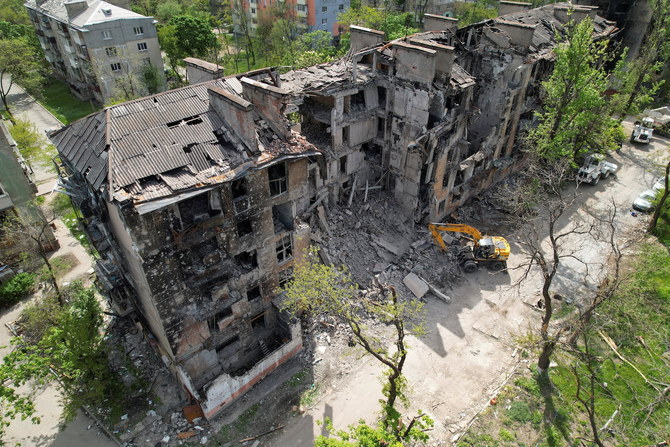KYIV/VILKHIVKA: Ukrainian forces reported battlefield gains on Wednesday in a counterattack that could signal a shift in the momentum of the war, while Kyiv shut gas flows on a route through Russian-held territory, raising the spectre of an energy crisis in Europe.
Following days of advances north and east of the second largest city Kharkiv, Ukrainian forces were within just several kilometers of the Russian border on Wednesday morning, one Ukrainian military source said on condition on anonymity. Before the advance, Russian forces had been on the outskirts of Kharkiv, a city 40 km (25 miles) from the frontier.
The advance appears to be the fastest that Ukraine has mounted since it drove Russian troops away from Kyiv and out of the country’s north at the beginning of April. If sustained, it could let Ukrainian forces threaten supply lines for Russia’s main attack force, and even put rear logistics targets within Russia itself within range of Ukrainian artillery.
In Vilkhivka, a shattered village east of Kharkiv, the thump of near constant artillery and swoosh of multiple rocket launchers could be heard from fighting at the front.
Andrii Korkin, 48, who had ventured to Vilkhivka to check on his parents’ home, said he was a native Russian-speaker, the group Moscow says it went into Ukraine to defend.
“I want nothing to do any more with the world of the Russian Federation,” Korkin said.
Although the village itself had been recaptured by Ukrainian forces weeks ago, the frontline was only now far enough away to make it safe to return.
The bloated body of a Russian soldier still lay moldering outside the bombed-out school where his unit had made its headquarters before being driven out.
Burned out tanks
On Wednesday evening, Ukraine’s general staff said its forces had captured Pytomnyk, a village on the main highway north of Kharkiv, about halfway to the Russian border. The governor of the Russian region on the other side, Belgorod, said a village had been shelled from Ukraine, wounding one person.
Further east, Ukrainian forces seemed to be in control of Rubizhne, on the banks of the Donets river.
“It is burned out, just like all Russian tanks,” a Ukrainian soldier told Reuters near Rubizhne next to the ruins of one Russian tank. “The weapons are helping a lot, the anti-tank ones.”
Kyiv has so far confirmed few details about its advance through the Kharkiv region.
“We are having successes in the Kharkiv direction, where we are steadily pushing back the enemy and liberating population centers,” Brig. Gen. Oleksiy Hromov, Deputy Chief of the Main Operations Directorate of Ukraine’s General Staff, told a briefing, providing no specifics.
Gas supplies
Wednesday’s move by Ukraine to cut off Russian gas supplies through territory held by Russian-backed separatists marked the first time the conflict has directly disrupted shipments to Europe.
Shipments from Russia’s export monopoly Gazprom to Europe via Ukraine fell by a quarter after Kyiv said it was forced to halt all flows from one route, through the Sokhranovka transit point in southern Russia. Ukraine accused Russian-backed separatists of siphoning supplies.
Should the supply cut persist, it would be the most direct impact so far on European energy markets of what the Kremlin calls a “special military operation” to demilitarise a neighbor threatening its security. Ukraine says it poses no threat and that the deaths of thousands of civilians and destruction of towns and cities show that Russia is waging a war of conquest.
Russia said it had imposed sanctions on the Polish part-owner of the Yamal-Europe pipeline that carries much of Russia’s gas to Europe and parts of a German subsidiary of Russia’s gas export monopoly Gazprom, in which Gazprom had ceded ownership. The implications of the move were not immediately clear.
“Hell on earth”
In southern Ukraine, where Russia has seized a swathe of territory, Kyiv has said Moscow plans to hold a fake referendum on independence or annexation to make its occupation permanent.
The Kremlin said on Wednesday it was up to residents living in the Russian-occupied Kherson region to decide whether they wanted to join Russia, but any such decision must have a clear legal basis. Earlier, TASS news agency quoted an official in the Russian-controlled administration as saying the region planned to ask President Vladimir Putin to incorporate it into Russia.
Russian forces have also continued to bombard the Azovstal steelworks in the southern port of Mariupol, last bastion of Ukrainian defenders in a city now almost completely controlled by Russia after more than two months of siege.
Ukraine’s Azov Regiment holed up inside it said Russia was bombing and trying to storm it. Ukrainian deputy prime minister Iryna Vereshchuk said Ukraine was seeking to swap Russian prisoners of war with the wounded soldiers in Azovstal.
“If there is hell on earth, it is there,” wrote Petro Andryushchenko, an aide to Mariupol’s Mayor Vadym Boichenko, who has left the city.
Kyiv says it is likely that tens of thousands of people have been killed in Mariupol. Ukrainian authorities say between 150,000 and 170,000 of the city’s 400,000 residents are still living there amid the Russian-occupied ruins.
The mayor said that unless medical care was restored and water systems repaired, epidemics would break out. “The majority of the current population is old and sick. Without proper conditions, mortality among vulnerable groups will increase exponentially.”
























